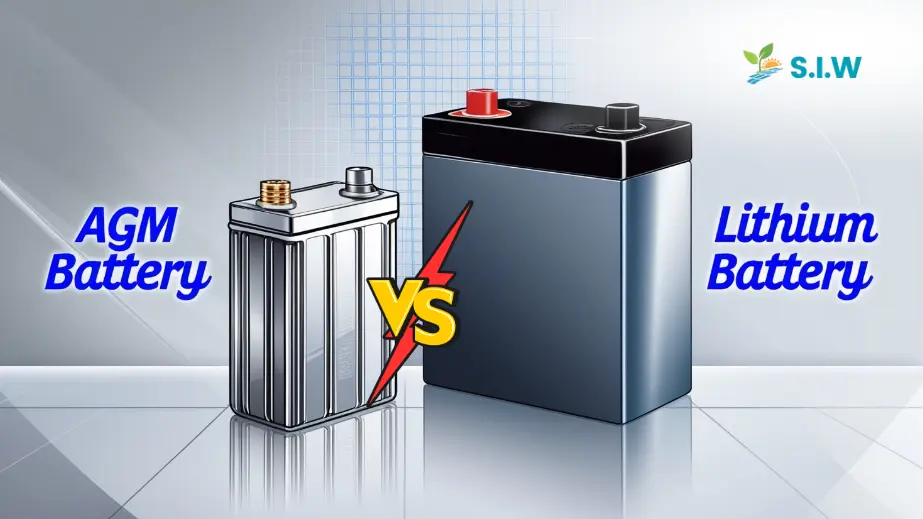In the world of batteries, two types are often compared: AGM batteries and lithium batteries. Both are commonly used in vehicles, renewable energy systems, and many other applications. But what are AGM batteries, and how do they differ from lithium batteries? This blog will explain the differences, benefits, and key uses of each in a way that’s simple to understand.
What is an AGM Battery?
AGM stands for Absorbent Glass Mat. This type of battery is a lead-acid battery, similar to the batteries used in cars, but it has some unique features. In an AGM battery, the electrolyte (a solution that helps the battery create electricity) is absorbed into a fiberglass mat, which is placed between the battery’s plates. This design keeps the battery’s acid in place, making it spill-proof and much safer.
AGM batteries were originally developed for military aircraft and vehicles, where reliability was critical. Today, they’re used in cars, RVs, boats, and backup power systems.
Features of AGM Batteries
- Spill-Proof Design
Since the electrolyte is contained within the absorbent glass mat, there’s no risk of it leaking out. This makes AGM batteries safer to handle and use. - Maintenance-Free
Unlike older types of lead-acid batteries, AGM batteries don’t require regular topping off of water. They are sealed and require very little upkeep. - Durability
AGM batteries are known for being tough and able to withstand cold temperatures and vibrations. This makes them ideal for vehicles and outdoor use. - Short Lifespan
One downside of AGM batteries is that they have a shorter lifespan compared to some other battery types, like lithium-ion.
What is a Lithium Battery?
Lithium-ion batteries are newer compared to AGM batteries and are widely used in electronics, electric vehicles, and renewable energy systems. There are different types of lithium batteries, but the most common is the Lithium-Ion battery. Unlike AGM batteries, lithium batteries use lithium compounds as their main material for storing energy.
Features of Lithium Batteries
- Lightweight
Lithium batteries are much lighter than AGM batteries, which makes them ideal for electric cars, drones, and other applications where weight matters. - Longer Lifespan
One of the biggest advantages of lithium batteries is that they last much longer than AGM batteries. A typical lithium battery can last up to 10 years or more with proper care. - Faster Charging
Lithium batteries charge much quicker than AGM batteries, which is why they are popular in fast-moving industries like electric vehicles. - Higher Cost
One drawback is that lithium batteries are more expensive upfront. However, their longer lifespan often makes them more cost-effective in the long run.
Key Differences Between AGM and Lithium Batteries
Now that we’ve covered the basics, let’s break down the main differences between AGM and lithium batteries:
1. Weight and Size
- AGM Battery: AGM batteries are heavier and bulkier due to their lead-acid design.
- Lithium Battery: Lithium batteries are lighter, making them a better option for situations where portability is key.
2. Lifespan
- AGM Battery: AGM batteries typically last 3 to 5 years with regular use.
- Lithium Battery: Lithium batteries can last 10 years or more, depending on the application and care.
3. Cost
- AGM Battery: AGM batteries are generally less expensive upfront but may need to be replaced more often.
- Lithium Battery: Lithium batteries cost more initially but can save money over time due to their longer lifespan.
4. Performance in Extreme Conditions
- AGM Battery: AGM batteries perform well in cold temperatures, which makes them a good choice for vehicles in colder climates.
- Lithium Battery: Lithium batteries don’t handle extreme cold as well but excel in warmer environments.
5. Charging Time
- AGM Battery: AGM batteries tend to charge more slowly than lithium batteries.
- Lithium Battery: Lithium batteries charge faster, making them more convenient for frequent use.
Which One is Better for You?
The choice between an AGM battery and a lithium battery depends on what you need the battery for. If you are looking for something that’s affordable, durable, and good for a vehicle or backup power system, an AGM battery could be a great option. However, if you want a battery that lasts longer, charges faster, and is lighter, a lithium battery might be the better choice.
For example, if you have an RV or boat and need a reliable power source for the short term, AGM batteries can be very effective. On the other hand, if you are using solar power and need a long-lasting battery, lithium might make more sense, even though it costs more upfront.
Final Thoughts
In conclusion, both AGM and lithium batteries have their unique advantages and disadvantages. AGM batteries are spill-proof, durable, and maintenance-free but have a shorter lifespan. Lithium batteries are lighter, have a longer lifespan, and charge faster, but they come at a higher cost. Depending on your specific needs, either one could be the right choice for you.
Understanding the differences between these two battery types helps you make an informed decision for your next project or purchase.








